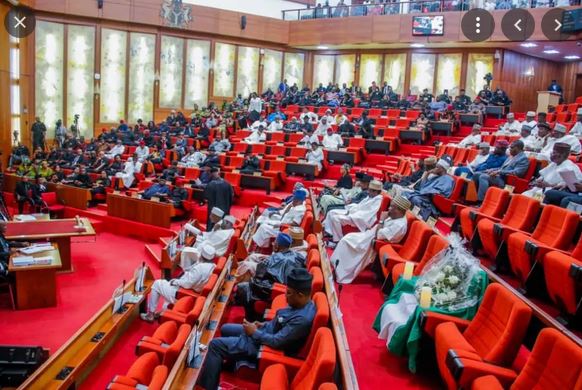The Nigerian Senate and the House of Representatives made history on Thursday 1st June 2021 when they passed the Petroleum Industry Bill (PIB) into law after two decades. The PIB’s approval is essential to attract investment into the Nigerian oil and gas industry.
The PIB passed the third reading after Mohammed Sabo, chairman of the joint committee petroleum (upstream and downstream) and gas, presented a report and its clauses were put to voice vote.
The bill has five parts, eight schedules, and 319 clauses.
While presenting the report on Thursday, Sabo said the legislation is aimed at “promoting transparency, good governance, and accountability in the oil and gas sector.”
The chairman said the committee recommended that 30 percent of Nigeria National Petroleum Corporation (NNPC) profit from oil and gas should be used to fund exploration of frontier basins.
“The various obsolete laws currently in operation in the country have been updated and consolidated in this chapter to meet global competitiveness and best practices,” he said.
“A total of 355 amendments were recommended to this chapter while others were retained.”
During the clause-by-clause consideration of the bill in the committee, the percentage that should be allocated to the host communities caused a division among the senators.
At the public hearing on the bill, representatives of the host communities demanded that they be allocated 10 percent.
Although five percent was proposed, the joint committee recommended three percent after a meeting of the senators with Timipre Sylva, minister of state for petroleum resources, and Mele Kyari, NNPC group managing director.
After three percent was accepted as what is due to host communities, Thompson Sekibo, senator representing Rivers north-east, challenged the decision to cut down to 3%.
Senate leader Abdullahi Yahaya described it as a bad precedent and urged Sekibo to withdraw his motion.
A senator representing Delta south James Manager said five percent was not too much for the host communities.
10 things to know about Nigeria’s PIB
- What is the Petroleum Industry Bill, PIB?
The Petroleum Industry Bill, PIB, 2020 is a law in the making, which seeks to introduce far-reaching reforms in the Nigerian oil and gas industry. It was first presented to the National Assembly in 2008.
- What are the major objectives?
The bill aims at establishing good governance, best practices, and ease of doing business in the industry by clarifying roles and responsibilities of officials and institutions, enable frontier exploration, mandate improved environmental compliance, and transform NNPC into a commercially viable enterprise.
- Why do we need the PIB?
The PIB is necessary because almost all petroleum-related laws, including the Petroleum Act of 1969, had been belated for decades. In other words, they are no more relevant and competitive globally. With the advancement in technology, the volatility of oil prices, climatic changes influencing the driving forces of the global economy, it has become imperative to review extant laws to bring them in alignment with current realities.
- What are the regulatory institutions to be expected?
The bill proposes the Upstream Regulatory Commission for upstream operations, including the granting of petroleum exploration licenses. A petroleum exploration license shall be for three years and may be renewable for an additional period of three years subject to the fulfillment of prescribed conditions. The PIB also provides for the establishment of the Midstream and Downstream Regulatory Authority for midstream and downstream operations. But the president has been advised to go for only one Commission with many departments, using the example of the Nigerian Communications Commission, NCC, as an example.
- What about the Host Communities Development Trust?
The PIB further provides for the creation of a Host Communities Development Trust. The oil operators, described as settlors, are obliged to incorporate a trust for the benefit of the host communities and shall make an annual contribution, based on a certain percentage of their yearly operating expenditure.
- What are the environmental concerns in the PIB? As a condition for the grant of a license or lease and prior to the approval of the environmental management plan, all licensees or oil companies are required to make financial contribution to an Environmental Remediation Fund for the rehabilitation or management of negative environmental impact with respect to the license or lease. Financial contributions depend on the size of the petroleum operations and the level of environmental risk that may exist.
The regulator will apply the Fund towards the rehabilitation, remediation or management of negative environmental impact only when the licensed operator lacks the capacity, or is unable to undertake the rehabilitation or management of any negative impact on the environment effectively.
- Why did previous administrations fail to pass the PIB into law?
The previous administrations failed to pass it into law because of many factors, especially politics, sectional interests, and lack of political will.
- Why has it become possible to pass it?
It was more enhanced by a combination of factors, including the commitment of the President Muhammadu Buhari-led administration, host communities and oil and gas operators. Unlike the past when community issues were widely condemned, the conversation about Host Community Trust Fund shifted to community representation, the structure of the fund, and equity stakes.
- What should the public expect in the coming weeks?
The public should expect the House of Representatives to conclude work on the PIB, which will be followed by a joint session of the Senate and the Representatives to review it, before the PIB goes to president Buhari.
- So, when will it eventually become an Act, and what impact should be expected?
It is now certain that the PIB will become an Act this year. It will bring about the restructuring of institutions, attracts local and foreign investors, and enhance transparency and accountability in the oil and gas industry.



